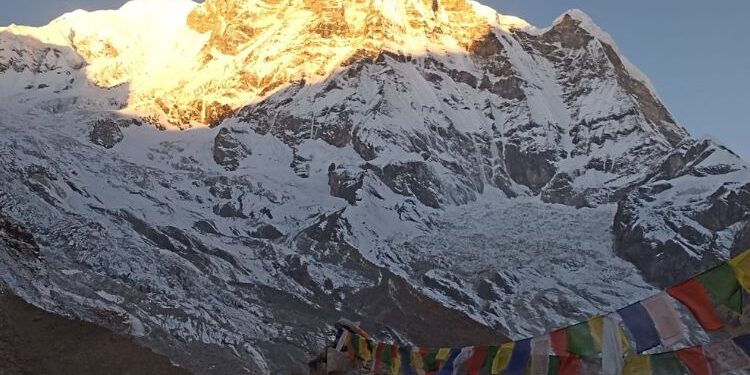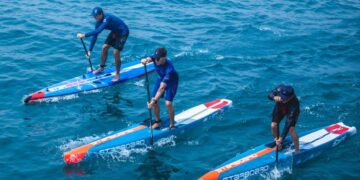Everest base camp trek is a bucket list adventure for many adventures enthusiast and it is one of the most popular and sought after treks in the world.
Drawing thousands to Nepal the trek to Everest base camp offers a chance to explore the base of the tallest mountain Mount Everest, immersing trekkers in a unique landscape and environment.
The desire to explore, the thrill of adrenaline, a spirited attitude, and budget considerations all contribute significantly to undertaking the Everest Base Camp trek.
However, the key component that cannot be overlooked is the fitness requirement.
Don’t underestimate the fitness level needed for the Everest Base Camp trek – it’s no walk in the park! Reaching the foot of the world’s tallest mountain requires serious physical preparation.
The Everest Base Camp trek is renowned for its moderate to difficult level, spanning a duration of two weeks.
While prior trekking experience is not mandatory, determination and physical fitness are crucial.
Although the Everest base camp trekking doesn’t require elite athleticism, you should be at ease walking uphill for several hours with a backpack.
The EBC trek entails daily walking durations of 5 to 9 hours, demanding a specific level of fitness encompassing cardio endurance and strength endurance.
Being comfortable carrying a daypack uphill for extended periods is essential.
How long before should I start training for EBC trek?
Start your training for the Everest Base Camp trek at least two to three months before you trek.
Adequate preparation for the physical demands of high-altitude trekking requires a significant investment of time and patience.
Initiate your training regimen 8-12 weeks before the trek, incorporating regular hikes or long walks at least once a week.
Emphasize duration over distance initially.
Gradually progress to the point where you can comfortably walk or hike for 5-6 hours with minimal breaks.
Keep in mind that slow progress is still progress, underscoring the importance of consistency and patience throughout your training.
Avoid overexertion, as pushing your body too hard can result in injury or exhaustion.
Instead, prioritize sufficient rest and hydration to allow your body to gradually develop the requisite strength and endurance for the upcoming trek.
Train in close environment to Everest base camp trek
To get ready for the Everest Base Camp trek, try to make your workouts similar to the conditions you will face there.
Structure your training to match the challenges of the trek and focus on exercises that prepare your body for it.
It is a good idea to find uphill hiking trails nearby and make a habit of hiking once or twice a week.
Walk for 5 to 6 hours each day with minimal breaks to build up your endurance.
To get better at carrying backpacks and walking, begin by using a daypack and slowly add more weight over time.
This will help you get in shape for the physical demands of reaching Everest Base Camp.
Here’s a breakdown of the fitness requirements for the EBC Trek:
Cardiovascular Endurance:
Cardiovascular endurance is super important for the Everest Base Camp trek because you will be walking a lot each day, sometimes for 6-8 hours.
Breathing can be challenging due to the thin air at high altitudes.
To prepare, do regular activities like brisk walking, running, swimming, or cycling for about 3-4 months before the trek.
These exercises will really help improve your stamina and make it easier for you to handle the long walks and steep climbs you’ll encounter during the trek.
So, focus on building up your cardiovascular endurance to ensure you’re ready for the demands of the journey.
Strength Training:
Building strength is important for the Everest Base Camp trek, especially in your legs, core, and upper body.
This helps you manage the uneven terrain, uphill climbs, and carrying a backpack.
Include exercises like squats, lunges, planks, and push-ups in your training routine to strengthen these muscles.
Pay special attention to your leg muscles, particularly your quadriceps and calves, as they play a significant role during the trek.
Incorporating exercises like squats, lunges, and calf raises into your workout routine will better prepare your body for the physical challenges you will face during your Everest base camp trekking.
Overall Fitness:
Maintaining good overall health is crucial for the Everest Base Camp trek, and it is essential to ensure you don’t have any medical conditions that could worsen at high altitudes.
Before starting any new training program, especially if you have existing health conditions, it’s vital to consult with a doctor.
Prior to the trek, seek a thorough medical check-up from a healthcare professional.
Discuss any pre-existing medical conditions or concerns that might impact your ability to trek at high altitudes.
This precautionary step helps ensure a safe and healthy experience during the challenging journey.
Mental preparation:
While the physical demands of the Everest Base Camp trek may not be excessively strenuous, mental preparation is equally crucial.
The trek to Everest base camp involves immersing yourself in a world of mountains, rivers, and diverse landscapes for an extended period.
Mental strength holds as much significance as physical fitness.
It is essential to mentally prepare for the challenges ahead, encompassing high altitudes, unpredictable weather conditions, and the physical rigors of the journey.
Building resilience and a positive mindset will contribute significantly to a successful and fulfilling experience during the trek.
Here are some additional tips for preparing for the EBC Trek:
-Gradually increase the intensity and duration of your workouts. Don’t try to do too much too soon, as this could lead to injuries.
-Stay well-hydrated before and during the trek. Proper hydration is crucial for acclimatization and overall well-being.
-Invest in good quality hiking boots with ample ankle support and gear. This will help you stay comfortable and safe on the trek reduce the risks of possible injuries.
-Train with the gear you’ll be using during the trek. This includes breaking in your trekking boots and getting used to using trekking poles.
-Maintaining a healthy diet is crucial when preparing for the Everest Base Camp trek, as proper nutrition contributes to your overall well-being and performance.
– Carry a well-equipped first aid kit. Include medications for common ailments, blister treatment, and any personal medications you may need including altitude medicines.














